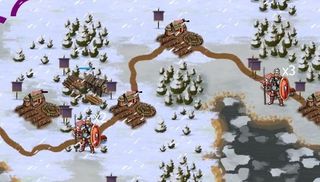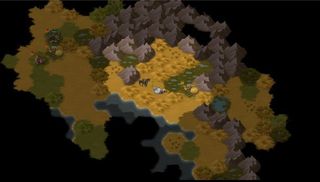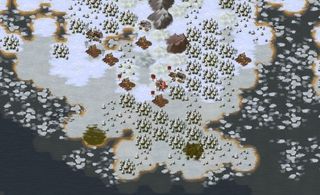Hardship and tough choices in Civ 5 designer's At The Gates

The lead designers of the last two Civilization games have both since left Firaxis to create strategy games independently. At The Gates is by Civ 5 designer Jon Shafer, and when he starts the latest build for me, it shows. It's a civ-building strategy game, with a pretty, slightly painted look masking the hex-based landscape Civ 5 introduced.
What's different, right away, is that you can see it. Civ games start you with almost no vision of your settler's surroundings, and you have to explore to find out what's nearby. At The Gates is set during the decline of the Roman Empire, and your small barbarian camp can see a large chunk of its surroundings from the start. It's intended to give you interesting decisions to make even in turn one.
What Jon's camp can see is mostly swampland and dry forest. Civ was set in bounteous lands, At The Gates is about hardship. A farm to the north provides food for now, but it'll eventually run out. A barbarian tribe has to move to survive.
Among that swampland are a few mystery locations — they could be valuable resources, but they take expertise to identify before they can be used. Jon trains a Surveyor — yes, a barbarian surveyor — and sends him out to investigate. Units take no time to train — in fact, you can produce as many as you can afford in a single turn, your resources are your only limit. But they're a tight limit. Losing one population from your camp slows its growth and reduces your tax income, all units cost some food per turn, and expert help like surveyors cost wealth per turn too — a salary.

The surveyor discovers the mystery resource is olives: as an aphrodisiac, they'll give him a boost to population growth. Jon sends a Scout to explore further south - and then surprises me by moving his settlement too. It's the equivalent of a Civ city in its importance, but since your barbarian tribe is on a much smaller scale, they can pick up sticks and move to a more convenient location at any time. It's a game about being a small group of survivors adapting to harsh and changing conditions, trying to grow as the huge but fractured Roman Empire crumbles around you.
In this case, the advantage of moving is supply. Jon needs to stay close enough to get food from the north farm, but his scout will slowly run out of food and equipment once he strays too far from the camp, so shifting south a little bit extends his range. When a unit runs out of supply, it's crippled but not dead. It can also encamp to conserve supply: stay where they are, focus on survival, and forage from the land.
But that land changes with the seasons: in summer, the dry forest near Jon's camp catches fire and burns down. His tribe is trapped in this burnt, swampy corner of the map: ocean to the north and west, mountains to the east, and a river he doesn't have the technology to cross to the south. But change isn't always bad: by November, the river will freeze over and his units can walk across it to the lands beyond.
PC Gamer Newsletter
Sign up to get the best content of the week, and great gaming deals, as picked by the editors.
I didn't get to see snow and ice because of a glitch in this build, so Jon had to cheat his Scout across the river to progress. The build actually looked very playable other than that — this was a random map, an improvised demonstration, and the game is more than a year from release in mid-2015. Jon says most of that will be balancing.

Closer to home, another of Jon's Scouts discovers a gold mine. This is a big deal — food is limited, but wealth is outright scarce. By this point Jon has built a second camp, but neither is close enough to mine the gold. He keeps his north camp by the farm, and moves his new one into range of the gold mine. Money! But at a cost. Once the camp's set up at the new location, Jon realizes it's now out of range of the only two patches of fertile land in the whole region. Without them, he can't build a farm - and at one turn a month, winter is closing in again.
He looks at it from every angle, but can't find any way to move his two settlements to cover the three things he needs: his original farm, the land for a new one, and the gold mine. Camps cost exponentially more the more of them you have, so a third is out of the question. Eventually, crestfallen, he moves his gold mining camp back to the fertile land to build a farm, losing his primary source of income to survive just one more winter.
It's funny to watch his reaction, because in so many ways this is a perfect demonstration of all the claims he's been making about the game's themes of hardship and tough choices. But at the same time, he's so invested in playing the game that he can't help but be dismayed at his predicament. I think both aspects speak well of At The Gates.
Most Popular

